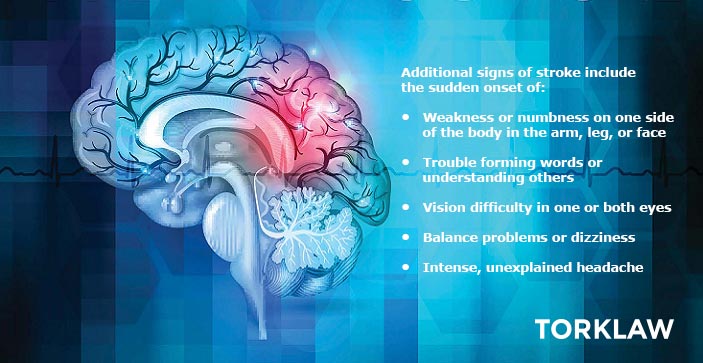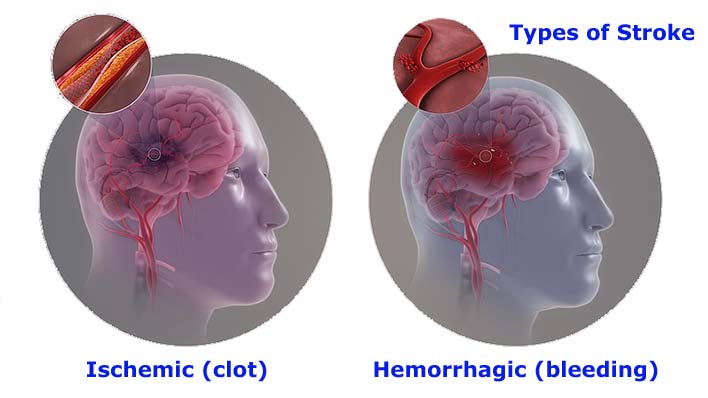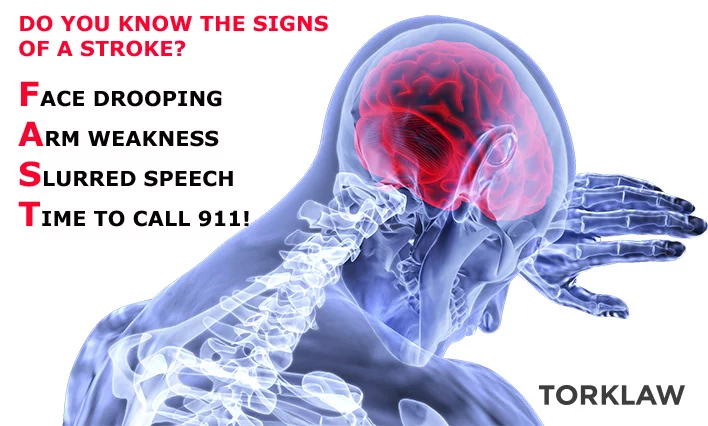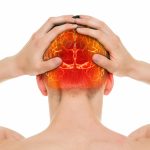May is National Stroke Awareness Month, and its purpose is to educate Americans about stroke symptoms, risks and prevention, to help save lives. In this post, [torklocal] would also like to educate readers about actionable legal claims for compensation when a stroke is caused or worsened by another person.
The Facts
A stroke is the result of an interruption or reduction to the brain’s blood supply that blocks the delivery of oxygen and nutrients to brain tissue.
Stroke is one of the top 5 leading causes of death in the U.S. and often results in severe disability. And while the risk of a stroke increases with age, a stroke can happen to anyone at any time.
Knowing the signs and symptoms of a stroke can ensure immediate medical treatment and greatly reduce the risk of death or permanent disability.
Signs of Stroke and What to Do
If you see the signs of a stroke, act FAST:
Face drooping on one side (Test by asking him/her to smile.)
Arm weak on one side (Ask the person to lift both arms.)
Speech slurred (Ask the person to repeat something simple.)
Time to call 911 if you observe any of these signs.
Additional signs of stroke include the sudden onset of these symptoms:
- Weakness or numbness on one side of the body in the arm, leg, or face
- Trouble forming words or understanding others
- Vision difficulty in one or both eyes
- Balance problems or dizziness
- Intense, unexplained headache

If you think you or someone else is having a stroke, every second counts! Fast medical treatment can mean the difference between complete recovery and long-term disability.
Risk Factors and Prevention
Most strokes happen as a result of health issues, such as high blood pressure, and not as the result of a single event like an auto or truck accident. You can prevent strokes and heart disease by managing your risk factors and observing common-sense health guidelines. Here are seven simple tips from the American Heart Association:
-
- Manage blood pressure; avoiding hypertension reduces your stroke risk by 47.9%
- Exercise regularly to reduce your risk by 35.8%
- Maintaining healthy cholesterol levels cuts your risk by 26.8%
- Eating a healthy diet reduces your risk by 23.2%
- Maintain a normal weight; avoiding obesity reduces your risk by 18.6%
- Not smoking reduces your risk by 12.4%.
- Reduce blood sugar; avoiding diabetes reduces stroke risk 3.9%.
Types of Stroke
Ischemic Strokes occur when blood clots block the supply of blood to the brain. 87 percent of all strokes are ischemic, and 15 percent of those occur in young adults and adolescents.
Hemorrhagic Strokes — there are two types:
- Intracerebral Hemorrhage occurs when an artery inside the brain ruptures.
- Subarachnoid Hemorrhage is the rupture of an artery outside the brain.
- Either may occur due to arteriovenous malformation (AVM), which is a birth defect.
Transient Ischemic Attacks (TIA) or “mini strokes” are caused by temporary clots, and are often a sign of carotid artery disease.
Cryptogenic Strokes are strokes of unknown cause.
Brain Stem Strokes can affect both sides of the body, leaving the person unable to speak or move below the neck.

Actionable Causes for a Stroke Compensation Claim
Strokes can also be caused by external factors, or worsened by poor medical care. In some cases, a stroke victim may have a valid legal claim.
Dangerous medications
The U.S. Food and Drug Administration (FDA) has issued warnings for both prescription and over the counter medications that increase the risk of a heart attack or stroke. When evidence exists that a particular medication was the likely cause of a stroke, it can result in a pharmaceutical product liability case. These include:
- Non-aspirin non-steroidal anti-inflammatory drugs (NSAIDs): Advil, Aleve, Celebrex, Motrin
- LEMTRADA (alemtuzumab) used to treat multiple sclerosis (MS)
- GoLean Detox, a weight loss product
- Testosterone products: AndroGel, Axiron, Bio-T-Gel, Fortesta, Striant, Testim and Testopel
Failing to prevent a stroke
Medical professionals may fail to diagnose the possibility of a stroke by neglecting to conduct the proper medical tests, or after diagnosing a stroke risk, they may fail to provide the right treatment. For example, patients with atrial fibrillation are at risk of a stroke unless they are prescribed blood-thinning medication such as Coumadin. Failure to treat a patient appropriately may be cause for a malpractice case.
Misdiagnosing or failing to treat a stroke once it has occurred
Once a stroke occurs, there is a very short window for treatment. If a medical professional incorrectly diagnoses a stroke as another medical condition, the stroke may not be treated in time. Many such cases involving a failure to use a drug called tPA, or tissue plasminogen activator (tPA) for ischemic stroke. This drug can dissolve a blood clot and restore blood flow to the brain, if administered within three hours. If a medical mistake delays administering tPA, it may be a valid medical malpractice claim.
Traumatic Brain Injury
Recently, two separate studies have linked traumatic brain injury (TBI) to the risk of stroke.
In 2011, researchers in Taiwan found that three times as many patients (675) who had a TBI suffered a stroke than the non-TBI patients in the same study (207). The study also found that stroke risk was higher among patients with skull bone fractures.
The three months following a TBI seemed to have the greatest risk. 2.91 percent of TBI patients suffered a stroke, compared with only 0.30 percent the non-TBI group, which is an increase of 10.21 times.
Intrigued by these findings, researchers at the University of Michigan and the VA Center for Clinical Management and Research examined California emergency room billing records between 2005 and 2009. Their findings were similar: ER patients with TBI were 30 percent more likely to be treated for stroke afterwards than non-TBI patients.
Does this mean that TBI causes stroke, or increases the risk? Or is the correlation due to other factors entirely? Possibly, after a TBI, a person’s general health declines, increasing the risk of many medical disorders, including stroke. If you or a loved one has suffered a stroke soon after a TBI that was the result of someone else’s negligence (such as a slip and fall or motor vehicle accident), it may be related.
Stroke Effects
Common effects of a stroke are: paralysis on one side of the body (the opposite side from where the stroke occurred in the brain); memory loss; speech or language problems; vision problems; and changes in behavior. These difficulties can lead to clinical depression or anxiety.
Stroke patients may suffer complications that include: seizures; limb contractures; brain edema (swelling of the brain); pneumonia; urinary tract infection and/or bladder control; bedsores; and deep venous thrombosis (DVT), or blood clots in leg veins due to immobility.
Any of these effects could result in additional health risks, or treatment errors, highlighting the need for immediate treatment to prevent such an outcome.
Stroke Treatment
Depending on how the patient was affected, there are many different types of effective drug therapies. In addition, physical therapy is often prescribed, and may include range of motion exercises, speech therapy, recreational therapy, vocational rehabilitation, bladder training programs, respiratory therapy and deep breathing.
Psychological treatment, including medication and/or counseling or cognitive therapy is also very useful, as are support groups.
Please take advantage of the information available during National Stroke Awareness Month to reduce your risk of stroke, and to learn the signs to identify a stroke. The life you save might be your own.
If you or a loved one has suffered a stroke, or worsening impact of a stroke, and you feel that someone else is at fault, call us at 888.845.9696. Your consultation is free, and we’ll tell you if your claim is valid.






